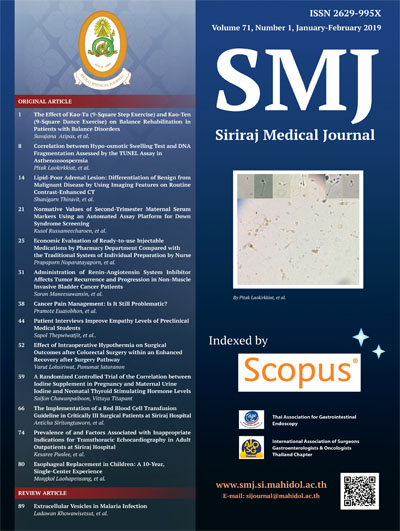Administration of Renin-Angiotensin System Inhibitor Affects Tumor Recurrence and Progression in Non-Muscle Invasive Bladder Cancer Patients
DOI:
https://doi.org/10.33192/Smj.2019.06Keywords:
Non-muscle invasive bladder cancer; renin-angiotensin system inhibitors; tumor recurrence; stage progressionAbstract
Objective: To evaluate the effects of renin-angiotensin system inhibitors (RASIs) on tumor-recurrence and diseaseprogression
in non-muscle invasive bladder cancer (NMIBC) patients.
Methods: From 2006-2015, 348 NMIBC patients at Siriraj Hospital were recruited for this study. Tumor-recurrence
was identified after the transurethral resection of bladder cancer (TUR-BT) and pathological confirmation of NMIBC,
while stage-progression was defined as muscularis-propria invasion after pathological review or metastases. Cox
proportional hazards models were used to assess the recurrence-free survival (RFS) and progression-free survival
(PFS) rates.
Results: Of the 348 patients, 86 (24.7%) received RASIs at the first TUR-BT. The median age was 68 years, and it
was significantly older for the RASI cohort. No differences in the tumor characteristics of the groups were found.
The median follow-up periods for tumor-recurrence and stage-progression were 2.3 and 3.7 years, respectively.
Forty percent of the patients experienced tumor-recurrence, with the no-RASI cohort experiencing a significantly
higher tumor-recurrence rate (46% versus 22%, p<0.001). The 5-year RFS rates were 54% and 78% for the no-RASI
and RASI cohorts, respectively (p=0.001). Stage-progression was observed in 6% of the patients. The 5-year PFS
rates were 87% and 97% for the no-RASI and RASI cohorts, respectively. On univariate and multivariate analyses,
a tumor size ≥3 cm and tumor multifocality were associated with recurrent bladder cancer (p<0.02). On the other
hand, the administration of RASIs was associated with a reduced recurrence (p≤0.002).
Conclusion: Our study suggests that RASI administration might be a potential factor to prevent bladder cancer
recurrence. Further study is needed to evaluate the effects of RASIs.
Downloads
Published
How to Cite
Issue
Section
License
Authors who publish with this journal agree to the following conditions:
Copyright Transfer
In submitting a manuscript, the authors acknowledge that the work will become the copyrighted property of Siriraj Medical Journal upon publication.
License
Articles are licensed under a Creative Commons Attribution-NonCommercial-NoDerivatives 4.0 International License (CC BY-NC-ND 4.0). This license allows for the sharing of the work for non-commercial purposes with proper attribution to the authors and the journal. However, it does not permit modifications or the creation of derivative works.
Sharing and Access
Authors are encouraged to share their article on their personal or institutional websites and through other non-commercial platforms. Doing so can increase readership and citations.















